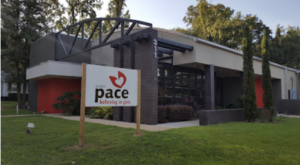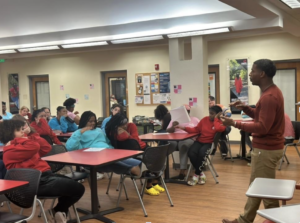
Pace Center for Girls is a non-profit organization that provides support, education, counseling, and advocacy to girls and young women facing significant life challenges, such as poverty, abuse, neglect, family dysfunction and academic struggles.
Pace, with a location in Tallahassee, provides various services, such as educational programs, counseling and therapy, mentorship, and career development, all of which assist girls in overcoming their challenges, developing resilience and self-confidence, and growing up to be successful and independent adults. The school offers a two-year education for grade levels 6-12 and provides the girls with five counselors and two therapists at all times.
The school has about 70 girls and takes pride in its small classes, making it easier for them to learn and understand what they are being taught. After the two years the graduates are able to return to their district school and get back on track. If by any means the girls feel unsafe or do not want to return to their district school, Pace will find another school that fits the girl’s needs.
As for 12th graders, Pace gives them the opportunity to receive their GED early and continues to reach out even after they have graduated.
At Pace Center for Girls, 10% of students scored at or above the proficient level for math, and 15% scored at or above that level for reading.
Mutaqee Akbar, from the law office of Akbar Thomas, came to Pace to speak about law school and careers in the legal field.
The majority of the girls at the school have either felt neglected by their family, pregnant, bullied or have failed a grade level or two. Dealing with hundreds of students, most teachers tend to push the girls aside, but at Pace, one-on-one meetings are held with the girls to discuss their weakest and most vital points and ways to improve their studies.
They prioritize giving the girls a safe environment and a voice. Instead of reprimanding when a student acts out, the teacher and counselors have meetings with the girls and focus on finding out what the problem is and what precautions can be taken.
Community program assistant Marvin Boatman has worked at the school for only a couple of months and has already experienced the stereotypes others place on the school. He came in thinking he needed to be stern with the girls because he was told that the school is only for troubled girls, but the moment he stepped into the building and felt the atmosphere, he saw that Pace was far from what outsiders describe it.
He said he realized that as long as the girls think they have a voice and are being heard, their actions change and motivate them.
“I’m coming on board to help and get people to come in and to see what it really is, get them to volunteer, donate and be a part of Pace girls so they can see it’s just like any other school,” Boatman said. “We learn from these girls and help the next person that comes along.”

Former Pace student Kristel Avilus attended the school 20 years ago when she was just 13 years old. Her mother was looking for an alternative school to put her in after Avilus had failed the eighth grade. At this point, Avilus had lost hope and the desire to attend school and refused to go to Pace, but her mother refused to give up on her.
“I hated it. Everyone was so excited and would constantly say, ‘Once a Pace girl always a Pace girl,’ and I was OK, you’re going to see when I leave I’m never coming back,” Avilus said. “I then realized this was the place, foundation, and support that I didn’t know I needed.”
After graduating from Pace, Avilus found out she was pregnant at age 15, and later married young at 18, but her journey at Pace taught her that it’s OK to struggle at times and that everyone’s pace is different.
She received her master’s in social work from Florida State University and now made history as the school’s first “Pace girl” executive director.
“The community and sometimes the narrative is that it’s your last chance but I tell the girls it’s your chance, not the last chance,” Avilus said.
Pace is one of the only gender-responsive, trauma-aware, and strengths-based programs for girls nationwide and has a solid body of research to support it.
PACE has locations around Florida and has received national recognition for its creative and successful approach to girls’ education and development.